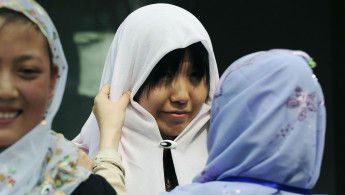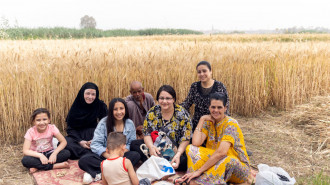Beijing makes Ramadan difficult for China's Muslims
Beijing makes Ramadan difficult for China's Muslims
Beijing authorities are reportedly making the Ramadan holy month as difficult as possible for observant Muslims in China's Xinjiang province, with restaurants forced to remain open during fasting hours.
2 min read
China's Uyghur Muslim minority say they are experiencing growing state discrimination [AFP]
Chinese Muslims not only have to grapple with 16 hours of fasting this Ramadan, but also attempts by Beijing authorities to drive the faithful to the temptation.
Restaurants in Xinjiang province have been ordered to open during daylight hours during the holy month, when observant Muslims typically fast.
Muslim communist party members have been ordered to work 24 uninterrupted hours on guard duty making fasting practically impossible, according to the World Uyghur Congress.
In one part of the province, Fridays this Ramadan - typically reserved for prayers at mosques and family time - sees the screening of communist propaganda films and sports activities, which students must attend.
It fits with continued efforts by Beijing to undermine nationalist and religious sentiments in Xinjiang province, the traditional home of Uyghur-speaking Muslims some of whom want independence from China.
In recent years the separatist struggle has spilled out into sectarian killing with jihadi groups - some with alleged links to the Islamic State group - launching attacks on non-Muslim civilians and security forces, Beijing claims.
The situation has led to a widespread clampdown in the western province with observant Muslims picked out for particular scrutiny.
Last month, Chinese authorities reportedly began to collect DNA samples from Muslim Uyghurs to store in a massive database.
Muslim names for babies have also been banned with the threat of jail for people sharing on social media quotes from the Quran.
Beijing has also attempted to dilute the ethnic and religious identity of the Uyghur through a policy of settlement in Xinjiang from China's Han majority, analysts say.
China says security and national unity are a priority for the country, and it does not tolerate religious or ethnic divides or violence against the state.
Requests for comment from the Chinese embassy in London were unanswered by time of publication



